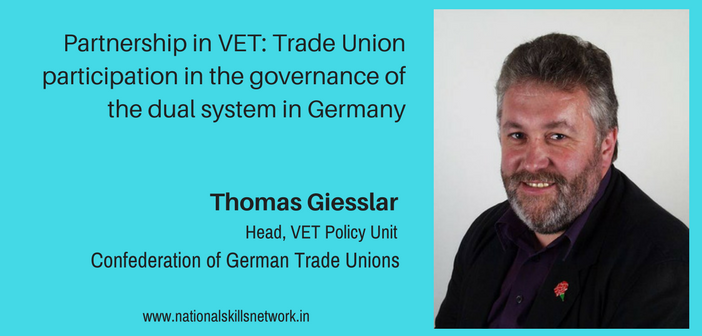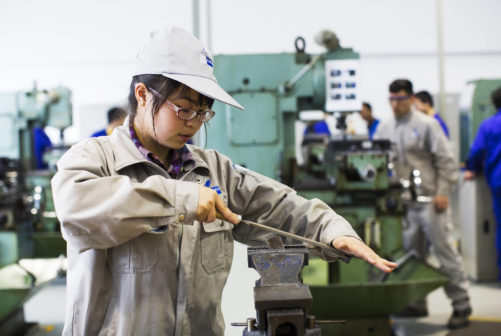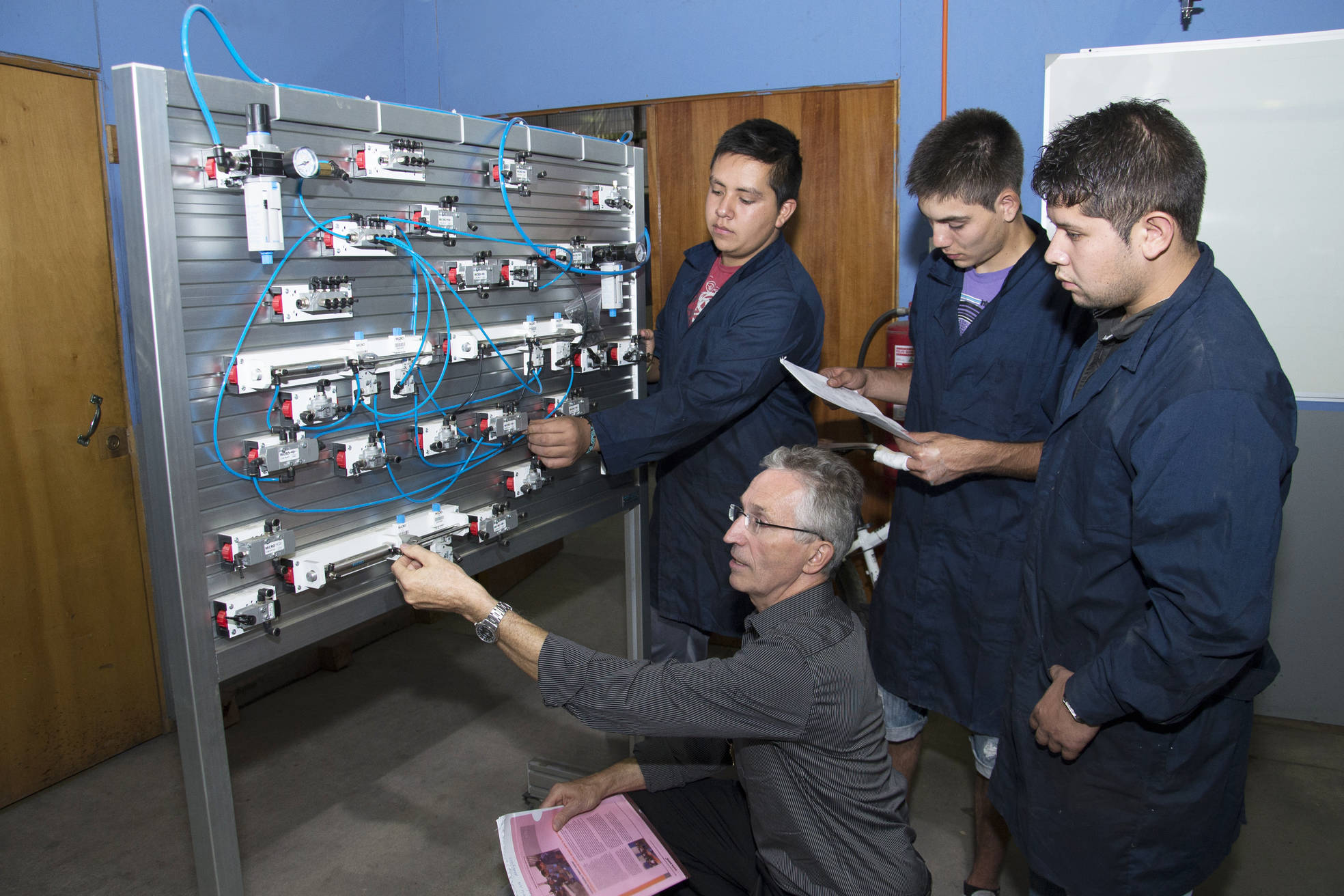As the main aspect of the Dual System is the in-company training, the Trade Unions ensure that the young Apprentices are adequately supported as well their views and concerns adequately reported at the main board of vocational education managed by the BiBB. The article by Mr Thomas Giesslar, Head of Vocational Education and Training Policy Unit at the Confederation of German Trade Unions (Deutscher Gewerkschaftsbund, DGB) explains the importance of Trade Union involvement in the Dual System.
The dual system of vocational education and training (VET) is of particular importance for the professional integration in Germany. In 2015 nearly half of the school leavers in Germany started a vocational training. The field of dual training covers every sector and about 330 certified training professions. A dual training to be a skilled worker usually takes three years and it is characterized by a regular alternation between school-based and in-company training. The main part of the training takes place in a private or public company on three to four days in a week. This in-company training is supported by school education that provides theoretical knowledge and technical skills on one or two days in a week.
Unlike in school-based vocational systems the apprentices in the dual system in Germany have a contract with the respective company, the company bears the cost of the in-company training and it also pays remuneration to the apprentices. Apprentices are largely protected against dismissal after a probationary period. So, as part of the companies the apprentices are in the trade unions’ area of responsibility – they are often trade union members themselves – and the German trade unions are deeply involved in the implementation and governance of VET.
 The structure of the German trade unions allows the trade unions a relative high capability to act. Though the trade union membership of about 20% is below average in international comparison, the coverage of collective agreements is with 45% of the employees quite high. The trade unions are organized along sectoral – not political – lines. In general this guarantees that the trade unions don’t compete with each other – following the principle one company, one trade union. Together with the employers’ organizations the eight sectoral trade unions with about 6 million members conclude collective agreements on a regional level. The independence of collective bargaining from stately influence is guaranteed by constitution. The sectoral unions are associated in the German Trade Union Federation (Deutscher Gewerkschaftsbund – DGB). The function of the DGB is restricted to representative tasks. The DGB has no influence on collective bargaining.
The structure of the German trade unions allows the trade unions a relative high capability to act. Though the trade union membership of about 20% is below average in international comparison, the coverage of collective agreements is with 45% of the employees quite high. The trade unions are organized along sectoral – not political – lines. In general this guarantees that the trade unions don’t compete with each other – following the principle one company, one trade union. Together with the employers’ organizations the eight sectoral trade unions with about 6 million members conclude collective agreements on a regional level. The independence of collective bargaining from stately influence is guaranteed by constitution. The sectoral unions are associated in the German Trade Union Federation (Deutscher Gewerkschaftsbund – DGB). The function of the DGB is restricted to representative tasks. The DGB has no influence on collective bargaining.
The German system of interest representation is characterized as “dual” as the interest representation by trade unions on sectoral level is complemented by an interest representation by strong works councils on company level. The works councils are elected by the employees of the respective companies. So, they are formally independent of trade unions. But in nearly every works council active trade union members are represented and the works councils usually are dependent on the trade unions’ support. This allows the trade unions to coordinate the works councils’ activities on an informal basis.

As the main part of dual VET is conducted in companies trade unions and employers’ organizations have a strong influence on the governance and implementation. Though the contents of the apprenticeships in companies are regulated by the federal law– guaranteeing a uniform national standard – the experts and trainer from the social partners are developing these training regulations and discuss them with the government before in the Main Committee in the Federal Institute for Vocational Training. This committee is composed of representatives of employees, employers and federal and regional governments in equal parts and it consults the federal government. Its also called Parliament of VET and gives recommendations in all fields and aspects of vocational education and training
At the regional-state level the State Committee of VET gives recommendations in all fields of vocational education and training with regard to the coordination between school and enterprise and to the Regional State government. In this committee are also representatives of the employers, the trade unions and the regional-state ministries.
The implementation of the company training is regulated by the competent bodies (mostly Chambers). There are also VET committees that are composed tripartite by trade union representatives, representatives of employees and teachers from the vocational schools. These committees are counselling and regulate the examination and certificates and are responsible for quality assurance
The strong involvement of the social partners in the regulation of training contents, examination and quality assurance guarantees that the results of the training highly correlate to the companies’ requirements and labor market needs. The procedures laid down in the training law ensure a balanced representation of the different interests of the stakeholders: Career profiles, training curricula and training plans are an expression of empirically determined qualification requirements and standards stemming from the training goals. A balance is struck between the priorities of the different stakeholders: ‘tailor-made’ qualifications for individual companies, broad-ranging occupational profiles for the relevant industrial sector and career development opportunities for the individual trainees. The procedures laid down in the training law take account of these different interests and their underlying policy orientations.
Beneath this strong influence on the contents of apprenticeship training the social partners are also regulating the framework conditions of the in-company training – working hours, remuneration, dismissal protection, health protection etc. – by collective bargaining. Usually every collective agreement has its own chapter on apprenticeship which is an important part of the bargaining. Finally the interests of apprentices are also represented on the company level. Apprentices and employees under 25 years can elect an own committee for the representation of their interests in their company which is part of the works council.
All in all due to the fact that main parts of the training take place in companies and with the objective to meet the labor market needs dual VET in Germany is regulated by social partners to a large extent. Though this process is often characterized by intense discussions of divergent interest’s trade unions and employers’ organizations usually find compromises in a pragmatic way. The particular status of German apprentices as employee-like members of the companies – not as pupils – makes them a special focus group for German trade unions. They get access to young potential members and therefore also represent interests of juveniles. Consequently, German trade unions all have their own youth organizations.
About the author

Thomas Giessler is head of the unit Vocational Education and Training Policy at the Confederation of German Trade Unions (Deutscher Gewerkschaftsbund, DGB) in Berlin. Giessler represents the trade unions on the main committee of Germany’s Federal Institute for Vocational Education and Training (BIBB) and on several of the Institute’s subcommittees and policy and budget bodies. Giessler is a brewer by training. Throughout his union service, Giessler has been involved in international outreach. He is a member of the Germany-France experts committee on workforce development, a similar committee for cooperation between Germany and Austria, and in 2012 became a member of Chancellor Merkel’s taskforce for workforce development cooperation between Germany and Spain.






Comments 1